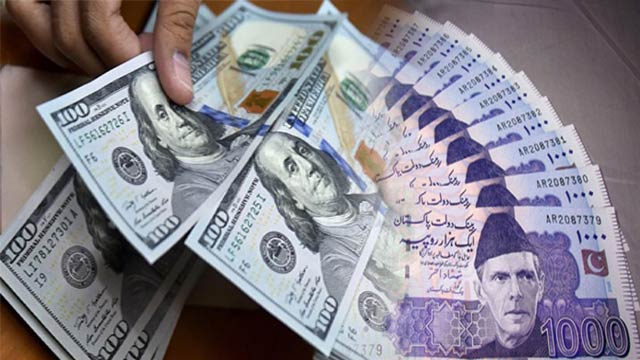ISLAMABAD: Closing out the year, the Pakistani rupee (PKR) is poised to claim the title of Asia’s worst-performing currency, and experts predict that the trend will persist into 2024. BMI Research anticipates a further decline, forecasting a plunge to 350 PKR per USD by the end of the coming year.
Throughout the current year, the currency has experienced a significant downturn, depreciating by 20.73 percent or 59.21 rupees against the US Dollar. Analysts, as reported by Bloomberg, suggest that the challenges facing the rupee are unlikely to subside.
“This looks like a currency that is set to adjust downwards,” remarked John Ashbourne, global economist at BMI in London, a Fitch Solutions company. He pointed to factors such as Pakistan’s high inflation and trade deficit as contributors to the rupee’s downward pressure.
Pakistan’s elevated debt payments and an external funding gap are exerting additional strain on the currency. The nation faced the threat of default this year, and a decline in foreign investments coupled with Asia’s fastest inflation are compounding its economic challenges, according to Bloomberg.
While the International Monetary Fund (IMF) recently approved a $700 million payout, temporarily averting a default, concerns linger that the nation’s economic difficulties may extend into 2024, necessitating further aid.
The looming possibility of a dollar shortage could give rise to parallel currency markets, a phenomenon that emerged last year when the central bank restricted access to foreign currency to safeguard dwindling reserves.
Despite government efforts to curb illegal buying and selling of the dollar at a premium to the official exchange rate, the rupee’s September record low seems to have had only a brief respite.
“It’ll be very hard in the long term to convince people to use the official rate if parallel markets give more value for a dollar,” commented Ashbourne. “The authorities can sort of push against the tide for a certain amount of time, but they aren’t able to do that sustainably.”
Goldman Sachs Group Inc. cautioned that the market will likely continue to demand a premium for the rupee due to soaring interest costs and reliance on short-term arrangements with lenders to maintain external balance.


